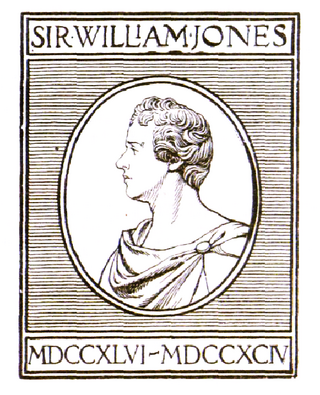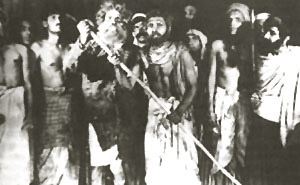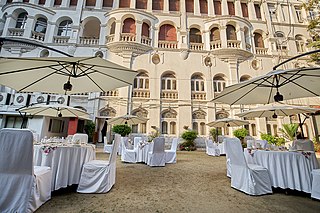Related Research Articles

State Bank of India (SBI) is an Indian multinational public sector bank and financial services statutory body headquartered in Mumbai, Maharashtra. SBI is the 45th largest bank in the world by total assets and ranked 221st in the Fortune Global 500 list of the world's biggest corporations of 2020, being the only Indian bank on the list. It is a public sector bank and the largest bank in India with a 23% market share by assets and a 25% share of the total loan and deposits market. It is also the tenth largest employer in India with nearly 250,000 employees. In 2023, the company’s seat in Forbes Global 2000 was 77.

Fort William is a fort in Hastings, Calcutta (Kolkata). It was built during the early years of Britain's administration of Bengal. It sits on the eastern banks of the River Hooghly, the major distributary of the River Ganga. One of Kolkata's most enduring British-era military fortifications, other than those in Bombay (Mumbai) and Madras (Chennai), it extends over an area of seventy hectares.

The Asiatic Society is a Government of India organisation founded during the Company rule in India to enhance and further the cause of "Oriental research". It was founded by the philologist William Jones on 15 January 1784 in a meeting presided over by Justice Robert Chambers in Calcutta, the then-capital of the Presidency of Fort William.

Prinsep may mean any of several notable members of the British Prinsep family.

James Prinsep was an English scholar, orientalist and antiquary. He was the founding editor of the Journal of the Asiatic Society of Bengal and is best remembered for deciphering the Kharosthi and Brahmi scripts of ancient India. He studied, documented and illustrated many aspects of numismatics, metallurgy, meteorology apart from pursuing his career in India as an assay master at the mint in Benares.

Modern banking in India originated in the mid of 18th century. Among the first banks were the Bank of Hindustan, which was established in 1770 and liquidated in 1829–32; and the General Bank of India, established in 1786 but failed in 1791.

Bengali theatre primarily refers to theatre performed in the Bengali language. Bengali theatre is produced mainly in West Bengal, and in Bangladesh. The term may also refer to some Hindi theatres which are accepted by the Bengali people.
Amiya Kumar Bagchi is an Indian political economist.

Romesh Chunder Dutt was an Indian civil servant, economic historian, translator of Ramayana and Mahabharata. He was one of the prominent proponents of Indian economic nationalism.

The Bengal Club is a social and business club in Kolkata, India. Founded in 1827, the club is the oldest social club in India. When Kolkata was the capital of British India, the club was considered to be the "unofficial headquarters of the Raj". The club is nowadays known for its old-world ambience and patronage among contemporary social and corporate elites, and is among a small number of Indian clubs featured in the elite list of the "Platinum Clubs of the World".

Nepal SBI Bank Limited (NSBL) was the result of the first Indo-Nepal joint venture in the financial sector sponsored by three institutional promoters, namely State Bank of India (SBI), Employees Provident Fund and Agricultural Development Bank of Nepal through a memorandum of understanding signed on 17 July 1992.
The Calcutta School-Book Society was an organisation based in Kolkata during the British Raj. It was established in 1817, with the aim of publishing text books and supplying them to schools and madrasas in India.
Nalinaksha Dutt (1893–1973), was an Indian scholar of Buddhism, professor of Sanskrit and Pali at the University of Calcutta and chaired The Asiatic Society, among other representative functions, as vice-president of the Maha Bodhi Society.
John Tytler (1790–1837) was a Scottish medical officer of the East India Company and orientalist. He was also a significant educator of Indian students in Calcutta.
George Udny (1803–1879) was a British civil servant in India, barrister and author.
Dipankar Basu was an Indian career banker who served as the fifteenth Chairman of the State Bank of India.
The Government Savings Bank (1833) was an Indian bank founded in 1833 in British India and operated until it was liquidated in 1843. The bank was the fifteenth oldest bank in India.
The State Bank Archives and Museum is an initiative to document and preserve the history of banking in the Indian subcontinent. The archive and museum opened on 13 May 2007 in the State Bank of India (SBI) headquarters in Kolkata.
References
- 1 2 3 4 "The Project Gutenberg eBook of The Hindoos as they Are, by Shib Chunder Bose". www.gutenberg.org. Retrieved 15 May 2021.
- 1 2 "A walk down history when India banked on Calcutta | Kolkata News - Times of India". The Times of India. TNN. 5 January 2020. Retrieved 15 May 2021.
- 1 2 Scutt, G. P. Symes (1904). The history of the Bank of Bengal; an epitome of a hundred years of banking in India. Cornell University Library. Calcutta, Printed by A.J. Tobias.
- 1 2 "THE HISTORY OF THE BANK OF BENGAL" (PDF). dspace.gipe.ac.in. 1904. Retrieved 14 May 2021.
- ↑ Roy, Shobha (7 July 2012). "SBI MUSEUM: A peek into the evolution of Indian banking". @businessline. Retrieved 15 May 2021.
- ↑ Roy, Shobha (7 July 2012). "SBI MUSEUM: A peek into the evolution of Indian banking". @businessline. Retrieved 15 May 2021.
- ↑ Calcutta Magazine and Monthly Register. 1830.
- ↑ "The Asiatic Journal and Monthly Miscellany". 1830.
- ↑ "The Asiatic Journal and Monthly Register for British and Foreign India, China, and Australasia". 1830.
- ↑ "The Asiatic Journal and Monthly Register for British India and Its Dependencies". 1830.